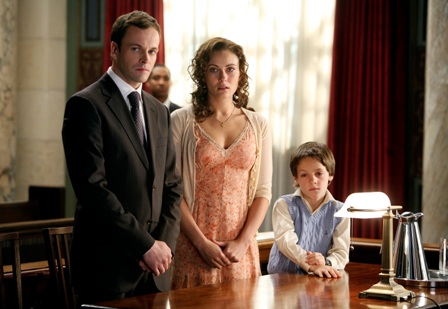On TV Controversy and 'Eli Stone'

The smarter way to stay on top of broadcasting and cable industry. Sign up below
You are now subscribed
Your newsletter sign-up was successful
ABC found itself in hot water over the pilot episode of legal drama Eli Stone, which debuts on the network Thursday evening. As Ed Wyatt of the New York Times reported, the pilot has Stone, the title character, representing the mother of an autistic child. The mother believes that a mercury-based preservative found in a vaccine caused her son’s affliction. In the end, the jury finds in favor of the mother, awarding her millions in damages
Eli Stone (Picture courtesy: ABC)
Legal procedurals are well known for featuring cases that have been “ripped from the headlines.” The Law & Order series and the CSI: series are notorious for this. In this case, the vaccine-autism debate may be in the headlines, but as far as most doctors and scientists are concerned, the case is settled.
The American Academy of Pediatrics released a statement condemning the show over the plotline:
“A television show that perpetuates the myth that vaccines cause autism is the height of reckless irresponsibility on the part of ABC and its parent company, The Walt Disney Co.,” said Renee R. Jenkins, MD, FAAP, president of the AAP. “If parents watch this program and choose to deny their children immunizations, ABC will share in the responsibility for the suffering and deaths that occur as a result. The consequences of a decline in immunization rates could be devastating to the health of our nation’s children.”
ABC responded to the complaint by promising to post a disclaimer before the show, and directing viewers to a CDC Web site that debunks the vaccine-autism link. “Eli Stone is a fictional television show. The characters, products, and events depicted in the episode are all fictional. The storyline plays on topical issues for dramatic effect, but its purpose is to entertain,” said the network in a statement.
All of this begs the question; does the realism that comes with such legal shows come at a price? Do people who watch these shows make legal or personal decisions based on them?
The smarter way to stay on top of broadcasting and cable industry. Sign up below
While for most viewers I suspect the answer is no, if even a few people based their daily decision-making process from a fictional TV show (especially regarding a subject as important as childhood vaccinations), the consequences could be severe.
Dr. Steven Novella, a neurologist at Yale University, wrote on his blog that there is not always a clean divide between drama and reality on television, and that it would be naïve to think it wouldn’t have an effect on people’s decision-making: “There are docudramas, infomercials, fake reality shows, staged events, and infotainment,” Novella wrote. “So the ABC show, a realistic courtroom drama covering a real issue “ripped from the headlines” but getting the science and the bottom line completely wrong, will create the vaccines-cause-autism meme in millions of people, and perpetuate this myth in popular culture.”
Novella adds that memory research has shown that people are notoriously bad at remembering where we get our information from, and that even when false information is corrected, people have a tendency to remember the falsified information as being correct later on.
So what does this all mean for Eli Stone? Well, the controversy could drum up some curious viewers, and hopefully the disclaimer will point parents towards the correct data on vaccines and autism. Ultimately it all underscores the power scripted entertainment still holds over much of us.
Law & Order is an entertaining show, but it is just that, entertainment. Free speech allows the networks to broadcast shows such as Eli Stone or CSI: or, for that matter, The X-Files or Chuck, but please, take them with a grain of salt.
There are shows you can watch to learn new things, but they generally won’t be hiding in the veneer of a courtroom drama. Reality, after all, isn’t always as dramatic as it is on TV.
